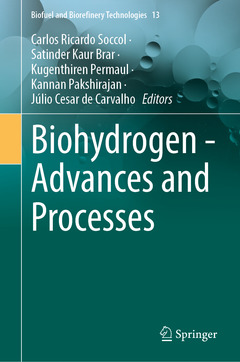Biohydrogen - Advances and Processes, 1st ed. 2024 Biofuel and Biorefinery Technologies Series, Vol. 13
Coordonnateurs : Soccol Carlos Ricardo, Brar Satinder Kaur, Permaul Kugenthiren, Pakshirajan Kannan, de Carvalho Júlio Cesar

This book presents an introduction to biohydrogen production and the recent advances and developments of the cleanest biofuel produced from bioresources.
Biohydrogen has the highest energy content relative to weight and burns cleanly ? generating just water. It is the best choice for fuel cells, where it generates electricity directly, in its reaction with oxygen. Biohydrogen occurs naturally as part of digestive gases from mammals and can be produced in specially designed anaerobic biodigesters, or through photocatalysis with microalgae. The gas is also easy to purify and use.
The economic production of biohydrogen is still full of challenges: From the efficient and rapid conversion of the substrate to storage, transportation, and safe use, there are several aspects that need to be developed.
Research in this field is addressing the issue of efficient large-scale production from several directions: Substrate pretreatment to enhance digestibility, metabolic networks analysis, microbial diversity and succession to highlight constraints in production, bioreactor, and downstream design to improve throughput and reduce costs, to name a few.The ideas and technologies presented in this book contribute to achieving the UN Sustainable Development Goal 7: Affordable and Clean Energy.
The book is written for researchers and students interested in biorefinery and biofuel technologies.Professor Carlos Ricardo Soccol is a research group leader within the Department of Bioprocesses Engineering and Biotechnology (DEBB) at the Federal University of Paraná. Professor Soccol has experience in bioprocessing/biological engineering, industrial biotechnology, biofuel technology, applied microbiology and fermentation technology. His research has resulted in 1418 publications, including 111 patents, 31 books, 175 book chapters, 511 original papers and 590 research communications at conferences/symposia. His research articles have so far been cited more than 40.000 times on Google Scholar (H-index = 95). He has also successfully supervised 91 doctoral students, 135 master's students, and 24 post-doctoral students. He is Professor HDR at the University of AIX-Marseille-France (2001- ). He was a visiting professor at École Polytechnique Fédérale de Lausanne, Switzerland (2009), University Lille 1-France (2014) and University Blaise Pascal, Clermont Ferrand-France (2015). He has received several national and international awards, including the Science and Technology Award of the Government of Paraná (1996), Best Scientific Achievement of the Year 2001 by Ministry of Sugar of Cuba (MINAZ), The Scopus/Elsevier Award (2009), Dr Honoris Causa, University Blaise Pascal-France (2010), Outstanding Scientist at 5th International Conference on Industrial Bioprocesses, Taipei, Taiwan, Henri Nestlé Award - Nestlé, Brazil (2014), Scientist of the Year - Nanocell Institute (2017), Medal of Scientific Merit by Ministry Science Technology and Innovation - Brazilian Government (2018). Since 2014, Professor Soccol is a member of the Brazilian Academy of Sciences and editor-in-chief of the Journal Biotechnology Research Innovation. He also holds the position of scientist IA of the National Council for Scientific and Technological Development - CNPq, Brazil. He is a technical and scientific consultant for several companies, and agencies and a co-editor a
Date de parution : 04-2024
Ouvrage de 621 p.
15.5x23.5 cm
Thèmes de Biohydrogen - Advances and Processes :
Mots-clés :
Biohydrogen; Anaerobic digestion; Dark fermentation; Feedstock; Microbial diversity; Biofuels; Patents



